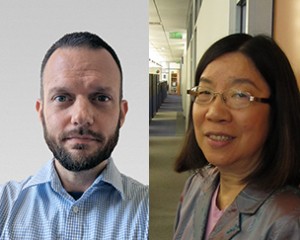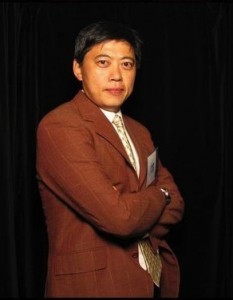
Bernd Becker, left, and Diana Wu, have been recognized for prolific research, with the most publications in their areas of expertise in the nation for the last five years.
Bernd Becker and Diana Wu, along with other faculty members who work at SJSU’s University Library are more than just librarians. They are prolific researchers who study how students use libraries in hopes of improving student success and information literacy.
San Jose State University’s Dr. Martin Luther King Jr. Library has been recognized as having the most prolific university library researchers in the nation based on number of articles published in subject specialty journals in the last five years (2011-2015), with Becker recognized for the most publications in the category of behavioral/social sciences and Wu recognized for the most publications in the category of information literacy and business resources. SJSU was ranked third overall out of 278 four-year institutions of higher learning for all categories. The rankings were announced at the Special Libraries Annual Conference in Philadelphia on June 13.
“My research focuses on the advances in technology as it influences the way academic librarians deliver their services and expertise,” said Becker, who has worked with the University Library for more than seven years, and was promoted to associate librarian in August 2015. “This interest is fueled by the innovative spirit that resides in Silicon Valley, and the readiness of the SJSU University Library to explore new approaches to academic librarianship.”
SJSU was cited as “best in the nation” in behavioral/social sciences for Becker’s work and business for Wu’s contributions, accounting for 26 percent and 28 percent of the national share of papers. SJSU librarians, who are classified as faculty members, published 36 articles in subject specialty journals in the last five years, outpacing their publication record for the previous 10-year analysis period (2000-2010).
Valeria Molteni, the interim associate dean for Research and Scholarship, said the active research by SJSU librarians ranges from research to improve how students use library resources in specific disciplines to collection development to how to best incorporate technology to how to help people develop skills to get the information they need in the moment.
“We are also doing research about space and how students experience it so we can improve services,” Molteni noted, adding that digital screens were added to 22 study rooms because through research librarians discovered that students wanted a way to practice presentations.
Emily Chan, the academic liaison librarian and scholarly communications coordinator, agreed that much of the research is focused on making libraries a third place where students spend their time outside of their homes or work places.
“The library is not only a place to study, but to eat, to socialize and to play,” Chan said.
Becker’s research is focused on developing best practices and principles for implementing high-tech, efficient library services for students and the university.
“Our library supports students who are going to be tech leaders,” Chan said. “We want to try to incorporate that and be responsive.”
During a sabbatical this fall, Becker plans to refine a longitudinal assessment tool of information literacy skills that he developed with fellow SJSU psychology professor Clifton Oyamot.
“My hope is to make this tool scalable so that any SJSU department interested in assessing information literacy can easily adopt it into the curriculum,” he said.
Diana Wu, who has worked with the University Library for nearly 30 years, said she is interested in how users receive and use information to fulfill their daily needs.
“For our students, I am especially concerned with how they educate themselves to become productive citizens,” she said.
Since she started with the University Library, she has been focused on information literacy and has coauthored multiple papers with other SJSU colleagues including Malu Roldan, Sue Kendall, Marilyn Easter, Bobbi Makani, Ann Agee and Connie Haley, from Chicago State University. Her articles, available on SJSU’s Scholarworks, have been downloaded 2,385 times by scholars at 111 institutions in 64 countries.
Wu and Becker’s research is ultimately focused on supporting student success. Becker said he appreciates his library colleagues and administration’s focus on placing student success above everything else.
“Student success is at the heart of my research,” he said. “Being that SJSU is a research and writing-intensive university, we have found that our students rely heavily on the University Library as they progress towards graduation. My research is dedicated to uncovering what their library needs are, and how we can best meet those needs.”
Wu said she helped to develop a campus-wide survey to collect data assessing information literacy proficiency, which has been helpful since information literacy has become one of the core proficiencies for graduation that is assessed by Western Association of Schools and Colleges (WASC) for accreditation.
In the coming year, she plans to work with junior colleagues on investigating student’s information seeking behavior in an era where most students rely on mobile devices to access information.
“Doing research is a long journey, and sometimes it can be lonely,” Wu said. “It requires dedication and self-discipline, but also requires support and encouragement. We need one another to generate and share knowledge for our students and the scholarly community – so be supportive and ready to listen.”
Wu said she has appreciated the encouragement through the years from administrators, including former Provost Carmen Sigler and former library Dean Patricia Senn Breivik, both of whom supported her as she completed “Information Literacy at the Workplace: a Cross-Cultural Perspective” with a grant from the Business Reference and Services Section of the American Library Association.
“We are always presenting and always moving forward,” Molteni said. “We are always looking for change.”
Read the full report.


